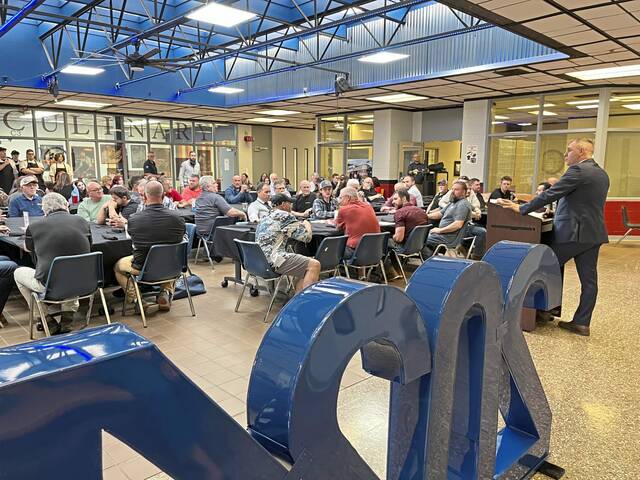https://staging.triblive.com/local/valley-news-dispatch/business-representatives-graduates-advise-northern-westmoreland-ctc-on-needs/
Business representatives, graduates advise Northern Westmoreland CTC on needs

The job prospects for students graduating from the heating and air conditioning program at Northern Westmoreland Career & Technology Center are 100%, says Mark Williamson, owner and president of MW Mechanical Services in New Kensington.
“Right now, there’s such a shortage of skilled labor, in our field and a lot of fields,” said Williamson, who founded his business in 2022 after graduating from Lenape Technical School in 2008.
But while the New Kensington school needs to keep up with the rapidly advancing and changing technology in the HVAC field, Williamson said it’s just as important that its students learn important life skills, such as attendance and accountability.
“If they’re not showing up to school, they won’t show up to a job,” he said. “They need to understand the importance that what they do here equates to what they’ll do when they leave here.”
Williamson is a member of the occupational advisory committee for Northern Westmoreland’s HVAC program, one of a dozen at the school. About 110 members of those committees gathered at the school Thursday evening for their annual spring meeting.
The committees, comprising business and industry representatives, former students and community stakeholders, meet in the spring and fall, usually in October, said Marcus Savage, an administrative assistant.
They were treated Thursday to a barbecue-themed dinner prepared and served by the school’s culinary students.
Northern Westmoreland serves the Burrell, Franklin Regional, New Kensington- Arnold and Kiski Area school districts. After graduating 93 students last year, this year’s class is 128, and 155 are expected next year.
The school looks to the committees to give it the information it needs to move forward. Recommendations from the committees last fall helped the school secure grants to pay for a scissor lift and wheel balancer for the auto program, and a simulation mannequin for health occupations, said Jason Hicks, who became Northern Westmoreland’s director this year.
“I’m always looking to obtain information for current equipment that will benefit our students to make them industry-ready and career- ready, as well as guidance for curriculum development and continuing to build relationships in the community,” Hicks said.
“We want to ensure that the curriculum and education the students are receiving parallels industry requirements, so we’re providing students the skill sets necessary to be successful for entry-level employment,” he said.
Trades have suffered because of high school students being pushed to college, said Rebecca Dalton, vice president of finance for MetPlas, a precision machining business in Harrison. She is on the advisory committee for advanced manufacturing and robotics.
“Skilled machinists are very difficult to find right now,” she said. “We do a lot of shop tours to get kids interested in manufacturing so they know there’s a good career out there.
“Anybody coming out of a machining program will have multiple job offers,” she said.
More students are needed in trades, said Heath Coffman, the CNC manager at Jatco Machine & Tool and a member of the committee with Dalton.
“A lot of kids don’t understand you can get paid, on-the-job training and not have college debt,” he said. “College doesn’t guarantee you a job. If you go to a trade school, you’re probably 75% to 85% guaranteed you’re going to find a job in your field.”
Schools such as Northern Westmoreland can give students the basics that companies can then build upon, Coffman said.
“Can they be taught? Can they remember everything?” he said. “You want to get somebody that doesn’t have bad habits. You want someone that can be molded. It’s hard to break somebody that has their ways of doing things already. Every company has their way of doing it.”
HVAC instructor Bob Myers said his students can’t remember everything, but they will know where to find what they need.
“I’m trying to make them craftsmen,” he said. “Nobody can get in this industry and be stagnant. You won’t be in this industry for long.”
Since most of his time is in the classroom, Myers said, the input from his committee is invaluable because his field is advancing and changing rapidly. He previously taught at Lenape, where Williamson was his student.
“They see it day in and day out. They’re on the front lines,” he said. “They’re my look into the real world.”
While keeping up with technology is important, it wasn’t the first priority Williamson cited.
“For us, it begins with culture and the right attitude,” he said. “It’s important they learn teamwork. If they can be a part of a team, they’ll be better at serving the customer.”
In the growing cosmetology field, there is a need for quality employees who now can be managers in six months instead of sweeping hair for three years, instructor Meghan Rozycki said.
“The need is there. They need to be expedited through,” she said. “They are fast-tracking into those positions behind the chair faster than we can prepare them.”
Among the members of the committees, 27% were Northern Westmoreland graduates, Hicks said.
“That’s a testament to our teachers and how well the school has prepared those individuals for employment,” he said. “That demonstrates that our teachers are doing what they should be doing.”
Meri Suzio of Arnold graduated from Northern Westmoreland’s cosmetology program in 2019. Working as a hair stylist and nail technician in Lower Burrell, she has been a member of the program’s committee for five years.
“It’s my little way of saying thank-you,” she said.
Today’s students who lived through the pandemic may be lacking in social skills and could use some help in talking with clients, Suzio said. She encourages students to get into salons while still in school so they can practice what they are learning and pick up those soft skills.
“That is the best way,” she said. “Nothing prepares you for the real world like being in a salon.”
Copyright ©2026— Trib Total Media, LLC (TribLIVE.com)
